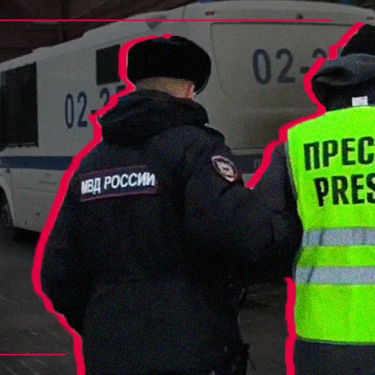Unprecedented arrests of journalists covering protest near Kremlin: RSF is dismayed by police threats against Moscow's remaining press correspondents

Around 20 journalists were arrested for a few hours on 3 February 2024 while covering a protest near the Kremlin by the wives of men mobilised to fight in Ukraine. Almost all those arrested were reporters, in what was clearly for Reporters Without Borders (RSF) an attempt to intimidate the few Russian and foreign media still officially operating in Moscow.
“The fact that most of those detained by the Russian police in this operation were journalists is unprecedented. When covering protests, reporters are normally arrested along with protesters. This incident reflects the Kremlin’s watchword for the media: ensure that neither the outside world nor the Russian people learn anything about expressions of popular discontent regarding the war in Ukraine. In the run-up to a presidential election to be held under Vladimir Putin’s closest control, we are alarmed by this attempt to intimidate the few press correspondents still present in Moscow.
The detained journalists – all men working for Russian outlets such as the business daily Kommersant and the independent website Sota.Vision and international media such as the French news agency AFP and the German news magazine Der Spiegel – were covering a protest near the Kremlin by women demanding that their husbands be brought home from the front in Ukraine, 500 days after mobilisation began. The reporters were knowingly targeted by the police because they were wearing press vests.
After being held for a long time in an unheated police van, they were taken to Kitay-Gorod police station in the centre of Moscow, where they were released after being made to sign a “warning” that the police “have information” that they personally “took part in public events organised in violation of the law,” although they were covering the protest for their media outlets.
This document has no legal value but, given the current suspension of the rule of law in Russia, it could be used as the basis of future criminal proceedings, for example, on a charge of “mass rioting,” which carries a 15-year prison sentence.
Two years after Russia’s large-scale invasion of Ukraine and as Vladimir Putin prepares to be reelected for a fifth term on 17 March, the country had become a “black hole” from which little information emerges.
Hundreds of journalists with independent media who were risking imprisonment have left Russia, as have major international media outlets. And in a development without precedent since the end of the Cold War, two US journalists – Radio Free Europe / Radio Liberty’s Alsu Kurmasheva and the Wall Street Journal’s Evan Gershkovich – are currently held pending trial.
